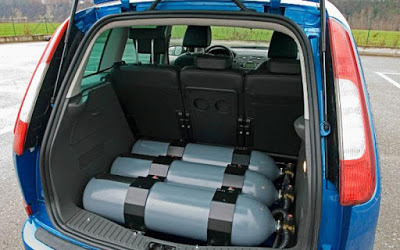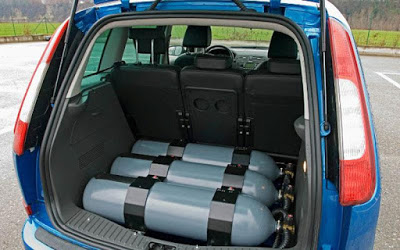In fact, the Service, through the spokesperson of Leonidas Leonidou, rings the alarm bell for tragedies in case of fire in a vehicle carrying LPG, without the necessary signage.
The Fire Service is in favor of LPG, as long as the conversions are made by authorized crews and the vehicles have special markings, so that firefighters in case of fire or explosion are aware of it.
It seems that the Government is not yet ready to publish the relevant decree that allows the use of LPG as a fuel in cars. However, according to information, there are several vehicles that use LPG as fuel and there are several gas stations that supply these vehicles with LPG. Is the Fire Department worried?
I do not know where the issue of this legislation is, but I know that for many years some vehicles have been using LPG as a fuel, even though it is not allowed by law. Now as far as the Fire Service is concerned, I must emphasize that as a Service we are always concerned when technological developments or changes may adversely affect the safety of our staff and the public. We are not worried about the use of LPG by vehicles that were built to use it (vehicles with dual fuel petrol / LPG engine). However, what worries us is the amateur and rough conversions by unskilled craftsmen without ensuring the necessary safety standards.
In other words, do you consider the use of LPG safe, when the safety standards are observed?
Theoretically and practically, both LPG and natural gas are safer than gasoline, as long as safety regulations and standards are met. In all countries of the world, LPG is considered extremely safe in motor vehicles. The use of LPG is allowed in many countries and especially in Europe. In Italy, for example, where LPG use in vehicles dates back to the early 1950s, there are now around one million LPG vehicles in circulation. Approximately the same situation prevails in Poland. In Turkey, more than 50% of vehicles use LPG. Regarding the use of natural gas, it is estimated that in 2015, there were 22,7 million vehicles that use natural gas as fuel. First country in the use of natural gas is China, followed by Iran, Pakistan and Latin American countries.
What do you think are the basic rules that must be followed to ensure the safe use of LPG, or natural gas in vehicles?
Only specialized technicians should be involved in the conversion of vehicles for the use of LPG or natural gas. The control and maintenance of LPG / natural gas systems in vehicles should also be undertaken by specialized craftsmen in certified laboratories. Vehicles using liquefied petroleum gas / natural gas must be systematically inspected by a qualified inspection team (MOT) with a qualified technician for this purpose. The license plates of vehicles that use LPG / natural gas must be clearly marked. This marking will give an indication to the Fire Department personnel about the fuel used by the vehicle, in case of fire or collision. Factory vehicles are usually marked on the rear, even on the sides.
Can all vehicles be converted to LPG at a later stage?
Almost all vehicles, both petrol and diesel, can be converted and use LPG (propane / butane mixture) as well as natural gas. I repeat that what matters is that any conversion is done by a qualified / licensed technician.
Risk of explosion or fire
What is your biggest concern about using LPG / natural gas in vehicles?
According to the data available to the Fire Service, every year we have 300 to 350 fires in vehicles. About half of these are due to arson and a significant number concern vehicles parked in parking lots of apartment buildings, ground floor and underground. Imagine in addition to the dangers of fire, to have an explosion in a basement or ground floor of an apartment building.
How easy is it to cause an explosion in a vehicle that uses LPG / natural gas?
If the vehicle is factory-built or properly converted by a licensed workshop and properly maintained, the risk of explosion is remote. Both experiments and surveys and statistics that have recorded large numbers of accidents have not recorded problems with ignition, leakage or explosion of the LPG tank in cars with LPG. Statistics show that 40% of petrol tanks can explode in a violent collision while only 8% of LPG tanks pose the same risk. However, if the vehicle has been converted as an amateur and without specifications, then the risk is very high and immediate. Tests have been carried out in Great Britain, Greece and elsewhere, where two LPG vehicles were set on fire, one factory and one amateur. The factory burned down completely without any other side effects, while the amateur factory had a strong explosion.
To clarify the issue legally, in order to have an audit
What about those who now put LPG and are not controlled?
Vehicles that use liquefied petroleum gas (LPG) as fuel are more secure than those that use liquefied petroleum gas, it is enough to build from scratch for this purpose, or to be converted by a qualified technician and according to safety standards. Let me add here that we know that, in order for vehicles that use LPG to circulate on the Cypriot roads, they procure it from somewhere. So some oil or gas stations are doing this work illegally at the moment. The appeal of the Fire Service is to clarify the issue legally, so that an audit can be carried out. When we have legal licensed refueling facilities and the vehicles in circulation are as I described above, then the risk of an accident will be minimal.
Source: Liberal

